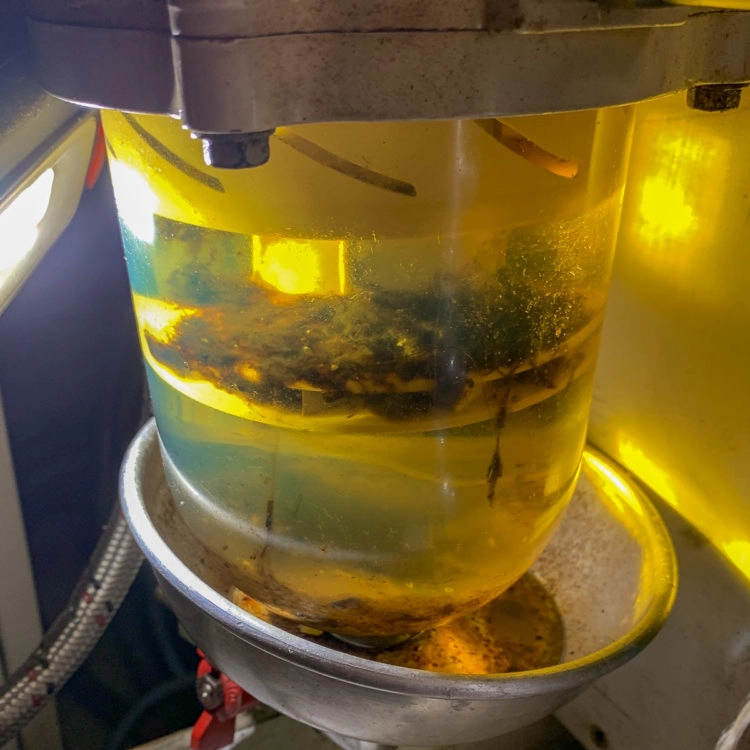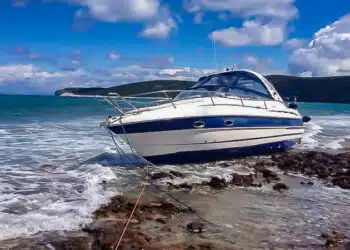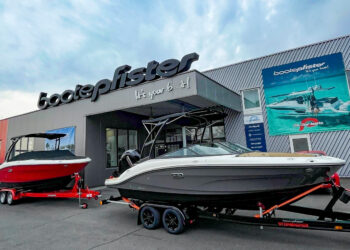What do hand hygiene and tank hygiene have in common? Both offer protection, but hand hygiene protects against viruses, especially the dreaded corona viruses, while tank hygiene protects boat owners from bacteria-induced diesel plague, which loves to spread in diesel tanks. Especially when these tanks are stored in a warm and humid environment, such as by or in water, problems with the diesel will occur. But once the bacteria have settled in the ship’s tank and multiplied accordingly, the only solution is professional tank cleaning, as carried out by SeaHelp’s cooperation partner MFT Mikrofiltertechnik from Geesthacht.
Five out of seven sailors had diesel sickness on board
They were now back on a SeaHelp-initiated tour of Croatia and brought back few surprising results to Northern Germany: 15 ships were inspected – out of a total of seven inspected sailboats, five were so badly contaminated that a tank cleaning had to be carried out immediately. Of the eight remaining motorboats, only one tank was heavily contaminated, but the remaining seven tanks also showed signs of bacterial growth. Currently, superimposed diesel is causing many problems.
Diesel plague: bacteria and ageing
Under the term diesel plague one almost puts two phenomena together: On the one hand the clearly visible formation of bacteria in the tank, on the other hand the invisible but equally dangerous ageing of the fuel, where the natural lubricity of the diesel fuel decreases so much that it can lead to major engine damage.
Bacteria love moisture
Predestined for bacterial growth and excessive aging are especially diesel tanks on leisure boats. Moist air enters the diesel tank through the tank ventilation, condenses on the tank walls and settles as water at the bottom of the tank.
Bacteria inevitably form at the interface between water and fuel and their growth is further promoted by the admixture of biodiesel. Their remains settle as dark, mostly black formations on the tank bottom. If the fuel now starts to vibrate, as caused by waves, they detach from the bottom of the tank, get into the fuel line and clog the fuel filter. The engine dies off due to a lack of diesel supply, usually in those moments when the skipper does not expect it at all. But many problems with diesel and diesel plague are avoidable.

Diesel aging leads to engine damage
At least just as dangerous, because not visible, the ageing of the diesel occurs. Aided by environmental influences, such as those predominantly found on ships, a chemical process is set in motion unnoticed after just over two months, which drastically reduces the lubricity of the fuel.
After just over six months, tests have shown that fuel lubrication is reduced by up to 50 %, which is suitable for destroying sensitive high-pressure diesel pumps. SeaHelp, too, has recently experienced increased problems with diesel fuel and diesel spills during operations.
Problem: Longer winter storage due to Corona
And this is precisely where the problem lies with diesel: when ships are stored in winter storage for up to six months, during the Corona pandemic even up to eight months, and no replacement takes place in the tank due to lack of consumption, this creates an excellent breeding ground for bacteria and other chemical processes that cause ageing due to lack of sufficient fuel stability. It is not without reason that the mineral oil trade recommends that commercial diesel should not be stored for longer than six months, but only in airtight conditions, not in diesel tanks with tank ventilation, as is customary on ships.
Only tank cleaning can help with bacterial infestation
Once you have the diesel plague in your tank, even most of the full-bodied promises of additive advertising are of no help. Only a tank cleaning can remove the stubborn clumps in the tank permanently.
The assertion that a pronounced diesel plague would be dissolved by additives and completely burned with the fuel belongs to the realm of “alternative facts”. Shock dosing can only help with the first signs of bacterial contamination. The problem with this is that it is difficult for the owners to find out how far the contamination in the diesel tank has already progressed.

Effective prevention through additives
Whatever helps to prevent problems with the diesel, however, is to add an appropriate amount of an effective diesel protection additive to the tank with each filling operation to kill even the smallest accumulations of bacteria and at the same time improve the stability of the diesel fuel.
Grotamar, Liqui Moly and ERC performed very well
But not everything that the industry brings to the market really helps. To separate the wheat from the chaff, SeaHelp’s editorial staff has conducted extensive testing, the results of which will be published in a forthcoming article. But this much can be revealed: The “top dogs” of the special additives, which are effective against diesel plague and diesel ageing, were also able to confirm this effect in tests in a recognised, independent laboratory. They listen to the names Grotamar, ERC Diesel Plus und Moly Diesel Protection.
Sailors should pay special attention to diesel sickness
The Croatia tour of the tank cleaners clearly shows it: diesel plague and diesel aging are a problem that will probably occupy the owners even more in the future. Especially the tanks of sailing ships were affected, which is not surprising in the end: Here the diesel fuel is stored in the tank for a long time, sometimes up to two years, and is exposed to constantly changing temperatures. The so-called tank breathing transports ambient air saturated with moisture into the tank, which condenses on the tank walls in the form of water and creates the best conditions for bacterial growth.
Motor yachts with fewer problems
But also owners of diesel powered motor yachts should not simply sit back: Longer downtimes in winter storage due to the COVID-19 pandemic also lead to a higher bacterial load, because there was simply no refuelling and no replacement in the diesel tank.
Not only hand hygiene – also sometimes tank hygiene
The SeaHelp Council: Pay a little more attention to your tank, especially as a sailor, but also if you own a motor yacht. Their sensitive injectors blow in the diesel at up to 2500 bar and even the smallest impurities can cause enormous damage to the injectors.
Livestream on YouTube from 05.03.2021













